Question Number 100131 by bemath last updated on 25/Jun/20
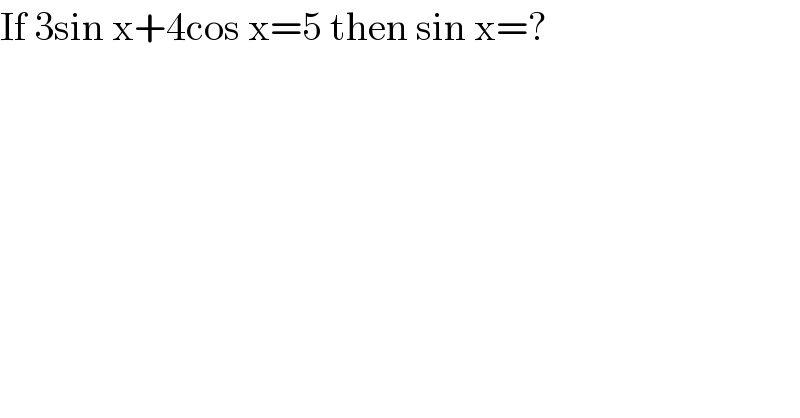
$$\mathrm{If}\:\mathrm{3sin}\:\mathrm{x}+\mathrm{4cos}\:\mathrm{x}=\mathrm{5}\:\mathrm{then}\:\mathrm{sin}\:\mathrm{x}=? \\ $$
Commented by bobhans last updated on 25/Jun/20
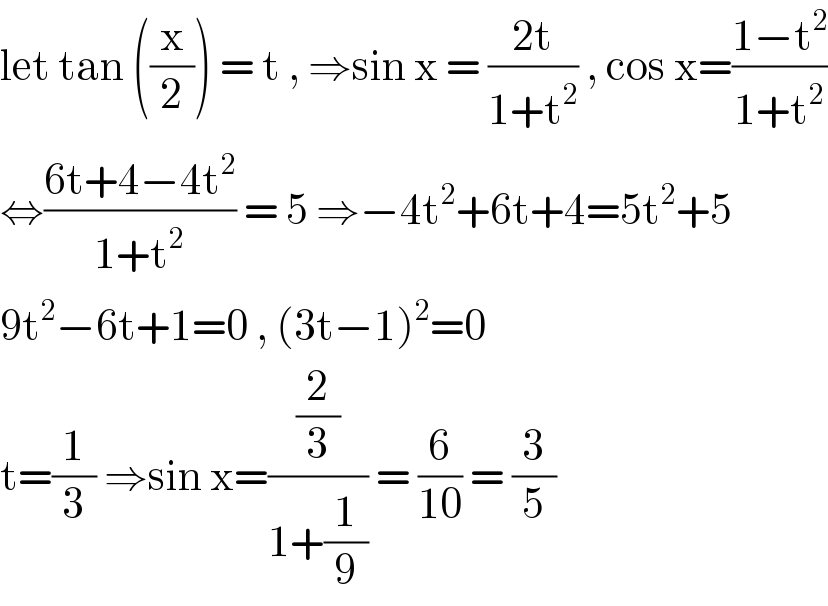
$$\mathrm{let}\:\mathrm{tan}\:\left(\frac{\mathrm{x}}{\mathrm{2}}\right)\:=\:\mathrm{t}\:,\:\Rightarrow\mathrm{sin}\:\mathrm{x}\:=\:\frac{\mathrm{2t}}{\mathrm{1}+\mathrm{t}^{\mathrm{2}} }\:,\:\mathrm{cos}\:\mathrm{x}=\frac{\mathrm{1}−\mathrm{t}^{\mathrm{2}} }{\mathrm{1}+\mathrm{t}^{\mathrm{2}} } \\ $$$$\Leftrightarrow\frac{\mathrm{6t}+\mathrm{4}−\mathrm{4t}^{\mathrm{2}} }{\mathrm{1}+\mathrm{t}^{\mathrm{2}} }\:=\:\mathrm{5}\:\Rightarrow−\mathrm{4t}^{\mathrm{2}} +\mathrm{6t}+\mathrm{4}=\mathrm{5t}^{\mathrm{2}} +\mathrm{5} \\ $$$$\mathrm{9t}^{\mathrm{2}} −\mathrm{6t}+\mathrm{1}=\mathrm{0}\:,\:\left(\mathrm{3t}−\mathrm{1}\right)^{\mathrm{2}} =\mathrm{0} \\ $$$$\mathrm{t}=\frac{\mathrm{1}}{\mathrm{3}}\:\Rightarrow\mathrm{sin}\:\mathrm{x}=\frac{\frac{\mathrm{2}}{\mathrm{3}}}{\mathrm{1}+\frac{\mathrm{1}}{\mathrm{9}}}\:=\:\frac{\mathrm{6}}{\mathrm{10}}\:=\:\frac{\mathrm{3}}{\mathrm{5}} \\ $$
Commented by bemath last updated on 25/Jun/20

$$\mathrm{thank}\:\mathrm{you}\:\mathrm{all}\: \\ $$
Commented by Dwaipayan Shikari last updated on 25/Jun/20
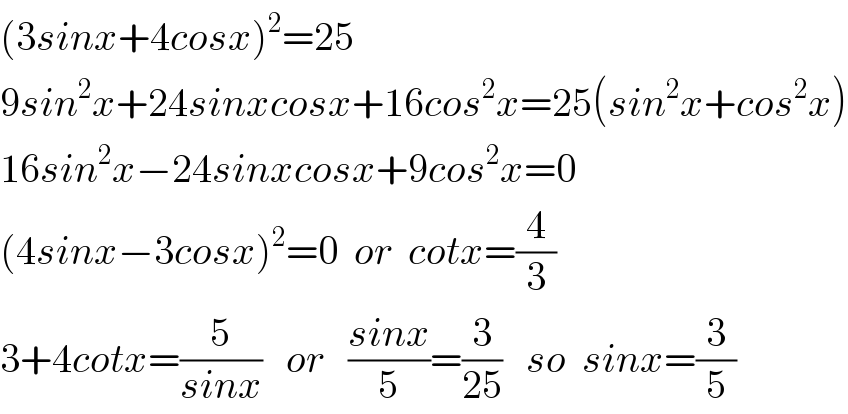
$$\left(\mathrm{3}{sinx}+\mathrm{4}{cosx}\right)^{\mathrm{2}} =\mathrm{25} \\ $$$$\mathrm{9}{sin}^{\mathrm{2}} {x}+\mathrm{24}{sinxcosx}+\mathrm{16}{cos}^{\mathrm{2}} {x}=\mathrm{25}\left({sin}^{\mathrm{2}} {x}+{cos}^{\mathrm{2}} {x}\right) \\ $$$$\mathrm{16}{sin}^{\mathrm{2}} {x}−\mathrm{24}{sinxcosx}+\mathrm{9}{cos}^{\mathrm{2}} {x}=\mathrm{0} \\ $$$$\left(\mathrm{4}{sinx}−\mathrm{3}{cosx}\right)^{\mathrm{2}} =\mathrm{0}\:\:{or}\:\:{cotx}=\frac{\mathrm{4}}{\mathrm{3}} \\ $$$$\mathrm{3}+\mathrm{4}{cotx}=\frac{\mathrm{5}}{{sinx}}\:\:\:{or}\:\:\:\frac{{sinx}}{\mathrm{5}}=\frac{\mathrm{3}}{\mathrm{25}}\:\:\:{so}\:\:{sinx}=\frac{\mathrm{3}}{\mathrm{5}} \\ $$
Answered by Rasheed.Sindhi last updated on 25/Jun/20
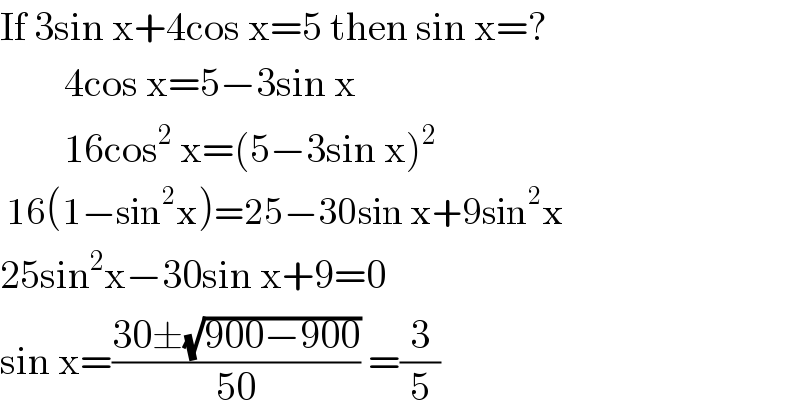
$$\mathrm{If}\:\mathrm{3sin}\:\mathrm{x}+\mathrm{4cos}\:\mathrm{x}=\mathrm{5}\:\mathrm{then}\:\mathrm{sin}\:\mathrm{x}=? \\ $$$$\:\:\:\:\:\:\:\:\mathrm{4cos}\:\mathrm{x}=\mathrm{5}−\mathrm{3sin}\:\mathrm{x} \\ $$$$\:\:\:\:\:\:\:\:\mathrm{16cos}^{\mathrm{2}} \:\mathrm{x}=\left(\mathrm{5}−\mathrm{3sin}\:\mathrm{x}\right)^{\mathrm{2}} \\ $$$$\:\mathrm{16}\left(\mathrm{1}−\mathrm{sin}^{\mathrm{2}} \mathrm{x}\right)=\mathrm{25}−\mathrm{30sin}\:\mathrm{x}+\mathrm{9sin}^{\mathrm{2}} \mathrm{x}\:\:\: \\ $$$$\mathrm{25sin}^{\mathrm{2}} \mathrm{x}−\mathrm{30sin}\:\mathrm{x}+\mathrm{9}=\mathrm{0}\: \\ $$$$\mathrm{sin}\:\mathrm{x}=\frac{\mathrm{30}\pm\sqrt{\mathrm{900}−\mathrm{900}}}{\mathrm{50}}\:=\frac{\mathrm{3}}{\mathrm{5}} \\ $$
Answered by mr W last updated on 25/Jun/20
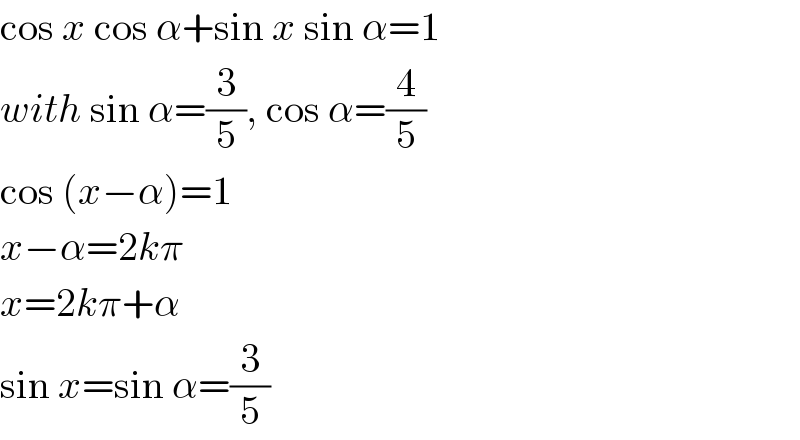
$$\mathrm{cos}\:{x}\:\mathrm{cos}\:\alpha+\mathrm{sin}\:{x}\:\mathrm{sin}\:\alpha=\mathrm{1} \\ $$$${with}\:\mathrm{sin}\:\alpha=\frac{\mathrm{3}}{\mathrm{5}},\:\mathrm{cos}\:\alpha=\frac{\mathrm{4}}{\mathrm{5}} \\ $$$$\mathrm{cos}\:\left({x}−\alpha\right)=\mathrm{1} \\ $$$${x}−\alpha=\mathrm{2}{k}\pi \\ $$$${x}=\mathrm{2}{k}\pi+\alpha \\ $$$$\mathrm{sin}\:{x}=\mathrm{sin}\:\alpha=\frac{\mathrm{3}}{\mathrm{5}} \\ $$
